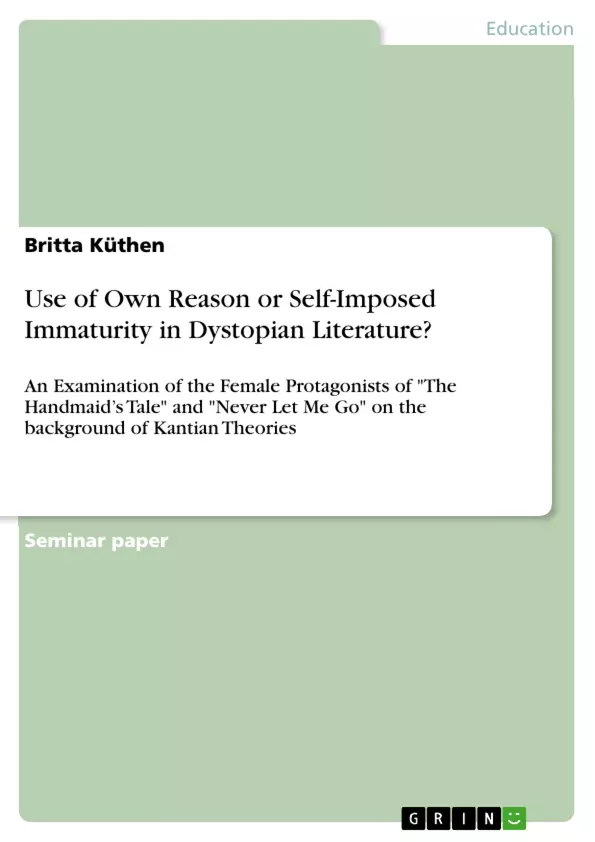At least since Aldous Huxley’s dystopian classic Brave New World, first published in 1932, dystopian literature has been quite popular up to the present. As for example, Suzanne Collins’ trilogy Hunger Games is one of the most influential as well as famous current dystopian novels. According to the Oxford Dictionary, dystopia as a literary term is defined as “[an] imagined place or state in which everything is unpleasant or bad, typically a totalitarian or environmentally degraded one. […]” (Oxford Dictionaries 2012).
The term paper at hand focusses on the individual living in totalitarian societies. Therefore, a closer look will be taken at the two female protagonists of Margaret Atwood’s The Handmaid’s Tale and Kazuo Ishiguro’s Never Let Me Go, Offred and Kathy. Their characters will be analyzed with special regard to their moral action as well as their use of reason living within a totalitarian system. The examination of the two characters is based on fundamental aspects of Kantian philosophy concerning the understanding of enlightenment, freedom and the use of reason.
Since totalitarian regimes, as presented in dystopian literature, usually are authoritarian and oppressive, it is interesting to consider if such a society leaves room for making use of one’s own reason (cf. Oxford Dictionaries 2012). Therefore the initial question of this term paper is: Do the two protagonists of The Handmaid’s Tale and Never Let Me Go make use of their own reason in terms of Kant’s definition of pure practical reason, freedom and enlightenment, or do they prefer to live under a self-imposed nonage?
To answer this question, the term paper is divided into four chapters. Following this introduction, the second chapter concentrates on Immanuel Kant’s philosophical theories. After a short expository passage, Immanuel Kant’s basic hypotheses on moral concepts as well as his image of man will be explained, serving as a basis for the examination of Offred’s and Kathy H’s characters.
In the first part of chapter two, the most important aspects of the Categorical Imperative will be illustrated. In the second part of chapter two, Kant’s concepts of pure practical reason, freedom and Enlightenment will shortly be introduced as well as explained.
In the third chapter, the two female protagonists’ characters will be analyzed by focussing on Kantian philosophy as exposed before. First of all, Offred from The Handmaid’s Tale and then Kathy H. from Never Let
Inhaltsverzeichnis (Table of Contents)
- Introduction
- Immanuel Kant
- The Categorical Imperative
- Kant's Concepts of Pure Practical Reason, Freedom and Enlightenment
- Examination of the Two Female Protagonists
- Offred from The Handmaid's Tale
- Kathy H. from Never Let Me Go
- Conclusion
Zielsetzung und Themenschwerpunkte (Objectives and Key Themes)
This term paper examines the use of reason by female protagonists in dystopian literature, specifically within the context of Margaret Atwood's The Handmaid's Tale and Kazuo Ishiguro's Never Let Me Go. It aims to analyze their moral actions and the extent to which they utilize reason within totalitarian systems, drawing upon Immanuel Kant's theories of enlightenment, freedom, and pure practical reason. The paper delves into the question of whether these protagonists actively engage their own reason or succumb to a self-imposed immaturity.
- The use of reason in totalitarian societies
- The moral agency of female protagonists in dystopian literature
- Kant's philosophy and its application to literary analysis
- The concept of self-imposed immaturity
- The role of freedom and enlightenment in individual agency
Zusammenfassung der Kapitel (Chapter Summaries)
The first chapter provides an introduction to the topic, outlining the focus on the female protagonists of The Handmaid's Tale and Never Let Me Go, and posing the central question of their use of reason within the context of Kant's philosophy. Chapter two delves into the key elements of Kant's philosophical theories, particularly his concept of the Categorical Imperative and his views on pure practical reason, freedom, and Enlightenment. This chapter serves as a foundation for the analysis of the female characters in the subsequent chapters. The third chapter examines the two female protagonists, Offred from The Handmaid's Tale and Kathy H. from Never Let Me Go, exploring their individual actions, their use of reason, and their levels of maturity. The final chapter, the conclusion, will synthesize the main arguments and insights from the preceding chapters to provide an answer to the initial question regarding the use of reason by the two protagonists.
Schlüsselwörter (Keywords)
Dystopian literature, female protagonists, reason, moral action, self-imposed immaturity, freedom, enlightenment, Kant's philosophy, The Handmaid's Tale, Never Let Me Go, totalitarian societies, pure practical reason.
Frequently Asked Questions
What is the central question of this term paper on dystopian literature?
The paper asks whether the protagonists Offred and Kathy H. make use of their own reason according to Kant's definitions, or if they prefer to live under 'self-imposed immaturity' within totalitarian systems.
Which novels are analyzed in the study?
The study focuses on Margaret Atwood's 'The Handmaid's Tale' and Kazuo Ishiguro's 'Never Let Me Go'.
How is Immanuel Kant's philosophy applied to these stories?
The analysis uses Kantian concepts of the Categorical Imperative, pure practical reason, freedom, and Enlightenment to evaluate the moral agency of the characters.
What does 'self-imposed immaturity' mean in this context?
It refers to the state of not using one's own reason without guidance from another, often out of fear or comfort, even when the capacity for independent thought exists.
Do totalitarian societies leave room for the use of reason?
This is a key point of the investigation, exploring how oppressive systems attempt to suppress individual enlightenment and how characters respond to these constraints.
What are the specific roles of Offred and Kathy H.?
Offred and Kathy H. are female protagonists living in highly controlled environments where their bodily autonomy and future are dictated by the state, serving as test cases for Kantian moral action.
- Quote paper
- Britta Küthen (Author), 2012, Use of Own Reason or Self-Imposed Immaturity in Dystopian Literature?, Munich, GRIN Verlag, https://www.grin.com/document/232614



